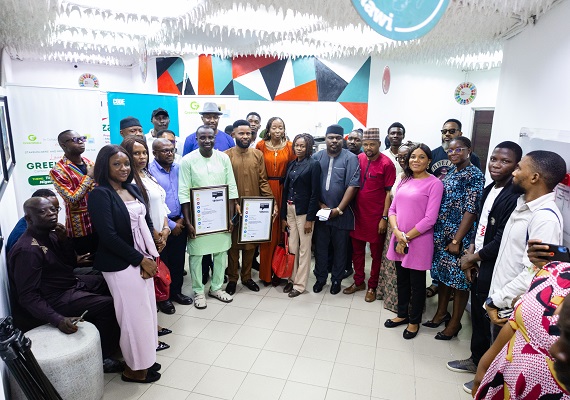
In a significant step towards achieving net-zero carbon emissions, the Green Waka, in collaboration with the UN Carbon Literacy Project, has launched the Nigeria Carbon Literacy Programme in Abuja.
This initiative aims to foster a pollution-free society where people and the environment coexist harmoniously, driven by the need for carbon literacy to motivate emission reductions.
Co-founder of Green Waka, Mr. Michael Mbaike emphasised the urgency of curbing emissions in Nigeria during his address. “Carbon literacy training is crucial for laying the foundation for Nigeria to tackle the climate change challenge and secure the nation’s future prosperity,” he stated. Mbaike stressed the importance of understanding the implications of daily anthropogenic activities.
“By understanding the science and our contribution to emissions, we can collectively benefit as a social group by reducing emissions,” Mbaike explained.
Nigeria’s commitment to achieving net-zero emissions by 2060, pledged at the UNFCCC COP26 in Glasgow in 2021, underscores the nation’s dedication to global climate change mitigation efforts. As Nigeria grapples with climate extremes, from drought to floods, becoming more resilient and minimising future temperature rises is increasingly challenging.
For a swift and just transition to net zero, Nigeria must harness the skills and energy of its people to address climate risks and seize opportunities. Public awareness is essential for engaging citizens in a just transition, ensuring that no one is left behind as the country moves away from fossil fuels.
Coordinator of the climate change unit at the Nigeria Labour Congress and keynote speaker, Comrade Echezona Asuzu highlighted the impact of the industrial revolution powered by crude oil and gas. “With more efficient fuels for transportation, the global economy aligned, leading to globalisation in extraction, production, distribution and emissions, especially in Europe, America and, later, Asia,” Asuzu noted.
Scientists report that atmospheric carbon dioxide concentrations have increased from about 280 ppm in the 18th century to 414 ppm in 2020, with 90 per cent of emissions occurring in workplaces. This highlights the demand for a just transition and climate justice by trade unions, as workers are on the front lines of climate change.
Asuzu emphasised that before the industrial revolution, global temperature rise was limited to +/- 1°C. Current fears suggest that by 2030, the temperature could exceed the 1.5°C benchmark. He also pointed out that Nigeria’s economy is heavily reliant on fossil fuels, with oil and gas exports contributing about 90 per cent of foreign exchange and 80 per cent of public sector finance.
The potential phasing out of fossil fuels, as demanded by the UAE Consensus at COP 28, raises concerns about Nigeria’s economic future. Asuzu urged trade unions and civil society organisations to address the root causes of the climate crisis, including excessive raw material extraction, processing, distribution, and overconsumption.
In global climate negotiations, developing countries have argued that “polluters must pay” for the impacts they have historically caused. Europe, for instance, is significantly investing in green energy, with renewables accounting for 23 per cent of energy in 2022 and expected to rise to 42.5 per cent by 2030.
Asuzu outlined the role of civil society in ensuring a just transition, including identifying problems, holding political leaders accountable, and demanding inclusive action plans for effective environmental governance. He stressed the importance of prioritizing evidence-led climate literacy programmes and interventions in workplaces, schools and businesses. Research is key to addressing climate challenges, and a just transition must genuinely include workers and civil society organisations.
Co-founder and director of advocacy for the Carbon Literacy Project, Mr. Phil Korbel urged certified candidates to educate Nigerians on the importance of driving towards a net-zero future. “Urgent action on climate change is driven by facts agreed upon by the world’s scientists,” Korbel said.
Chairman of the Nigerian Union of Journalists (NUJ), Mr. Patrick Osadibarei encouraged certified candidates to become carbon literate, highlighting the significant implications for the nation. He advised them to utilise products that contribute to reducing emissions.
By fostering carbon literacy and engaging citizens, Nigeria is taking crucial steps towards a sustainable and just transition to a net-zero future.

